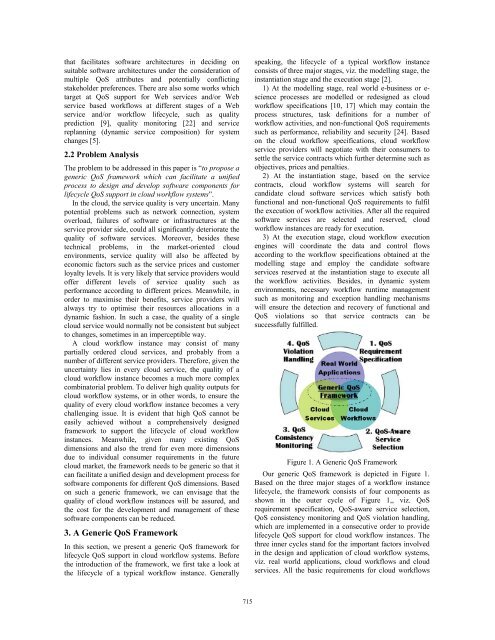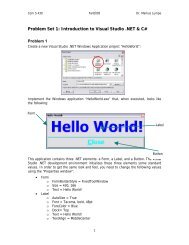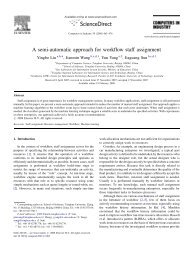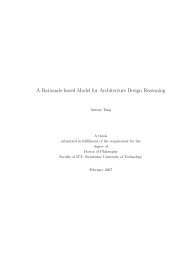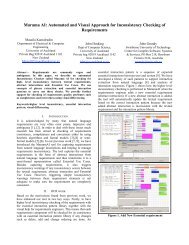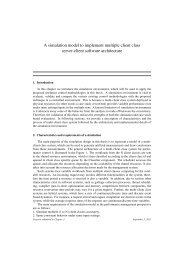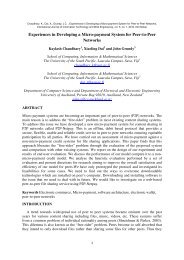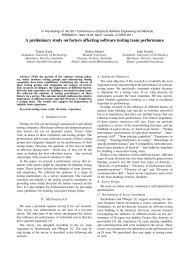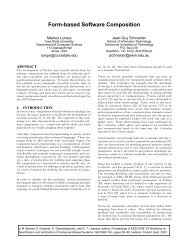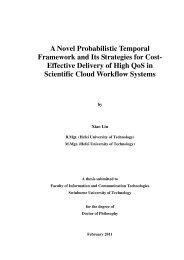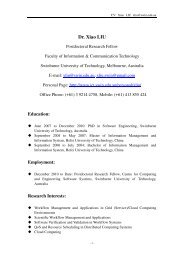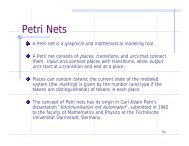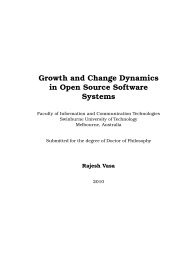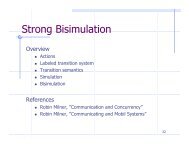A Generic QoS Framework for Cloud Workflow Systems - IEEE Xplore
A Generic QoS Framework for Cloud Workflow Systems - IEEE Xplore
A Generic QoS Framework for Cloud Workflow Systems - IEEE Xplore
Create successful ePaper yourself
Turn your PDF publications into a flip-book with our unique Google optimized e-Paper software.
that facilitates software architectures in deciding on<br />
suitable software architectures under the consideration of<br />
multiple <strong>QoS</strong> attributes and potentially conflicting<br />
stakeholder preferences. There are also some works which<br />
target at <strong>QoS</strong> support <strong>for</strong> Web services and/or Web<br />
service based workflows at different stages of a Web<br />
service and/or workflow lifecycle, such as quality<br />
prediction [9], quality monitoring [22] and service<br />
replanning (dynamic service composition) <strong>for</strong> system<br />
changes [5].<br />
2.2 Problem Analysis<br />
The problem to be addressed in this paper is “to propose a<br />
generic <strong>QoS</strong> framework which can facilitate a unified<br />
process to design and develop software components <strong>for</strong><br />
lifecycle <strong>QoS</strong> support in cloud workflow systems”.<br />
In the cloud, the service quality is very uncertain. Many<br />
potential problems such as network connection, system<br />
overload, failures of software or infrastructures at the<br />
service provider side, could all significantly deteriorate the<br />
quality of software services. Moreover, besides these<br />
technical problems, in the market-oriented cloud<br />
environments, service quality will also be affected by<br />
economic factors such as the service prices and customer<br />
loyalty levels. It is very likely that service providers would<br />
offer different levels of service quality such as<br />
per<strong>for</strong>mance according to different prices. Meanwhile, in<br />
order to maximise their benefits, service providers will<br />
always try to optimise their resources allocations in a<br />
dynamic fashion. In such a case, the quality of a single<br />
cloud service would normally not be consistent but subject<br />
to changes, sometimes in an imperceptible way.<br />
A cloud workflow instance may consist of many<br />
partially ordered cloud services, and probably from a<br />
number of different service providers. There<strong>for</strong>e, given the<br />
uncertainty lies in every cloud service, the quality of a<br />
cloud workflow instance becomes a much more complex<br />
combinatorial problem. To deliver high quality outputs <strong>for</strong><br />
cloud workflow systems, or in other words, to ensure the<br />
quality of every cloud workflow instance becomes a very<br />
challenging issue. It is evident that high <strong>QoS</strong> cannot be<br />
easily achieved without a comprehensively designed<br />
framework to support the lifecycle of cloud workflow<br />
instances. Meanwhile, given many existing <strong>QoS</strong><br />
dimensions and also the trend <strong>for</strong> even more dimensions<br />
due to individual consumer requirements in the future<br />
cloud market, the framework needs to be generic so that it<br />
can facilitate a unified design and development process <strong>for</strong><br />
software components <strong>for</strong> different <strong>QoS</strong> dimensions. Based<br />
on such a generic framework, we can envisage that the<br />
quality of cloud workflow instances will be assured, and<br />
the cost <strong>for</strong> the development and management of these<br />
software components can be reduced.<br />
3. A <strong>Generic</strong> <strong>QoS</strong> <strong>Framework</strong><br />
In this section, we present a generic <strong>QoS</strong> framework <strong>for</strong><br />
lifecycle <strong>QoS</strong> support in cloud workflow systems. Be<strong>for</strong>e<br />
the introduction of the framework, we first take a look at<br />
the lifecycle of a typical workflow instance. Generally<br />
speaking, the lifecycle of a typical workflow instance<br />
consists of three major stages, viz. the modelling stage, the<br />
instantiation stage and the execution stage [2].<br />
1) At the modelling stage, real world e-business or e-<br />
science processes are modelled or redesigned as cloud<br />
workflow specifications [10, 17] which may contain the<br />
process structures, task definitions <strong>for</strong> a number of<br />
workflow activities, and non-functional <strong>QoS</strong> requirements<br />
such as per<strong>for</strong>mance, reliability and security [24]. Based<br />
on the cloud workflow specifications, cloud workflow<br />
service providers will negotiate with their consumers to<br />
settle the service contracts which further determine such as<br />
objectives, prices and penalties.<br />
2) At the instantiation stage, based on the service<br />
contracts, cloud workflow systems will search <strong>for</strong><br />
candidate cloud software services which satisfy both<br />
functional and non-functional <strong>QoS</strong> requirements to fulfil<br />
the execution of workflow activities. After all the required<br />
software services are selected and reserved, cloud<br />
workflow instances are ready <strong>for</strong> execution.<br />
3) At the execution stage, cloud workflow execution<br />
engines will coordinate the data and control flows<br />
according to the workflow specifications obtained at the<br />
modelling stage and employ the candidate software<br />
services reserved at the instantiation stage to execute all<br />
the workflow activities. Besides, in dynamic system<br />
environments, necessary workflow runtime management<br />
such as monitoring and exception handling mechanisms<br />
will ensure the detection and recovery of functional and<br />
<strong>QoS</strong> violations so that service contracts can be<br />
successfully fulfilled.<br />
Figure 1. A <strong>Generic</strong> <strong>QoS</strong> <strong>Framework</strong><br />
Our generic <strong>QoS</strong> framework is depicted in Figure 1.<br />
Based on the three major stages of a workflow instance<br />
lifecycle, the framework consists of four components as<br />
shown in the outer cycle of Figure 1,, viz. <strong>QoS</strong><br />
requirement specification, <strong>QoS</strong>-aware service selection,<br />
<strong>QoS</strong> consistency monitoring and <strong>QoS</strong> violation handling,<br />
which are implemented in a consecutive order to provide<br />
lifecycle <strong>QoS</strong> support <strong>for</strong> cloud workflow instances. The<br />
three inner cycles stand <strong>for</strong> the important factors involved<br />
in the design and application of cloud workflow systems,<br />
viz. real world applications, cloud workflows and cloud<br />
services. All the basic requirements <strong>for</strong> cloud workflows<br />
716 715


